Procol • April 15, 2025
End-to-End Guide to What is Procurement Contract Management?
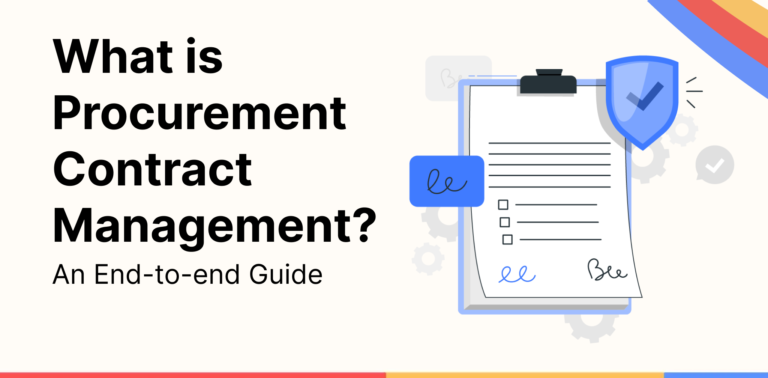
What is a procurement contract?
Procurement contract management covers the total management of contracts, creation & performance, and termination. The procurement contract management process deals with the creation of contracts, administration, negotiation of terms, monitoring performance, and compliance regulation following performance measures and dates.
It is meant to protect the interest of the company by implementing effective management of its contracts and guarantees, followed & able to produce the required results.
What is procurement contract management?
Procurement contract management is the detailed process of managing contracts with suppliers and vendors from start to finish. It involves creating, discussing, completing, observing, and improving contracts. The contract management process in procurement ensures that the agreement is legally binding, strategically beneficial, and effectively managed throughout its lifecycle. This process is important in business operations as it helps organizations smooth supplier relationships, control costs, ensure timely delivery of goods and services, and reduce minor risks.
A good procurement contract decides the duties, responsibilities, and expectations, reducing the chances of debates and misunderstandings between both parties. Effective contract management consists of a combination of legal, financial, and operational oversight to ensure compliance with management, industry standards, and private policies. By applying a structured approach to contract management, businesses can improve supplier performance, drive cost efficiencies, and increase overall ownership activity.
Procurement contract management process
Multiple processes are involved in the procurement contract management process, ensuring that contracts are skillfully managed from start to end. Every stage plays an important role in protecting business interests, maintaining supplier relationships, and making sure of compliance with agreed-upon terms.
- Contract planning:
- Identifying ownership needs, objectives, and key contract needs.
- Directing risk assessments and setting rating basis for suppliers.
- Defining contract terms, including pricing, deliverables, and timelines.
- Supplier selection & contract discussions:
- Managing market research and inviting plans from likely suppliers.
- Judging supplier bids based on quality, cost, and capability.
- Working out contract terms to ensure fairness, cost efficiency, and risk reduction.
- Contract carrying out & approval:
- Approving the contract with legal and assent teams.
- Securing important approvals from owners.
- Making sure both parties understand and agree to their duties.
- Contract performance & compliance overseeing:
- Tracking supplier performance over agreed service levels and important performance indicators (KPIs).
- Ensure compliance with regulatory and organizational rules.
- Addressing any contract deflection, disputes, or delays on time.
- Risk management & issue resolution:
- Identifying possible risks, including supply chain disruptions, financial risks, and legal problems.
- Implementing reduction strategies and eventuality plans.
- Handling debates, contract breaches, or performance failures successfully.
- Contract renewal, changes, or removal:
- Judging contract effectiveness and supplier performance.
- Working out terms or extending contracts based on business needs.
- Removing contracts when they are no longer helpful or upon contract termination.
A skilful contract management process makes sure that organizations gain maximum value from their procurement agreements while maintaining transparency, accountability, and risk control.
Importance of contract management in procurement
Contract management is an important function in procurement that directly affects cost efficiency, supplier performance, and business success. Without proper contract overseeing, organizations risk financial losses, legal debates, and operational inefficiencies.
Cost control & financial efficiency
Successful contract management helps businesses work out better pricing, payment terms, and cost-saving chances. It prevents financial outflow by making sure that suppliers stick to agreed pricing and terms, avoiding hidden costs or unauthorized changes.
Risk mitigation & compliance
Procurement contracts come with inbuilt risks, including supply chain disturbance, quality issues, and regulatory non-compliance. A well-managed contract outline makes sure that organizations identify likely risks early, implement reduction strategies, and go along with legal and industry standards.
Improved supplier performance & relationship management
Contracts set up performance standards for suppliers, including delivery timelines, service quality, and debate resolution processes. Regular contract analysis and supplier rating encourage accountability, helping businesses maintain strong and good supplier relationships.
Operational efficiency and transparency
Organizations can smoothen procurement processes, automate compliance tracking, and reduce human errors by maintaining well-structured contracts and using contract management software. Clear contract documentation ensures transparency and accountability in procurement transactions.
Strategic decision-making
Contract management gives important data insights into supplier performance, cost trends, and ownership productivity. Businesses can use this data to make sharp decisions, develop better procurement strategies, and improve contract talks in the future.
Business continuity & competitive advantage
A strong contract management process ensures business flow by linking trustable suppliers and maintaining stable assessment operations. Organizations with successful contract management gain a competitive edge by reducing assessment risks, improving cost efficiency, and improving supplier partnerships.
In short, procurement contract management is important for organizations looking to upgrade their procurement strategy, maintain financial health, and achieve long-term business growth. An organized approach to contract management not only improves efficiency but also strengthens risk management and supplier relationships, ensuring a smooth procurement process.
What are the key stages of contract management in procurement?
- Contract planning: Defining procurement needs, identifying risks, and setting clear goals.
- Seller selection & talks: Grading suppliers, negotiating terms, and finalizing agreements.
- Contract accomplishment: Signing the contract and making sure of legal and regulatory compliance.
- Performance overseeing: Tracking supplier performance and costs and sticking to contractual duties.
- Compliance and risk management: Making sure all contractual terms are followed while managing likely risks.
- Renewal or conclusion: Evaluating contract skillfulness and deciding whether to renew, renegotiate, or end the agreement.
Procurement management vs contract management
Though procurement management and contract management are interconnected, they are still different entities on their own. It is important to understand how both procurement management and contract management work for a smooth procurement contract lifecycle management.
Procurement management is about acquiring goods or services or any other logistic work to meet organizational needs. It involves planning, identifying requirements, seller evaluation and selection, bidding, negotiation, and procurement contract lifecycle management.
Contract management, on the other hand, is about ensuring that the agreements made with sellers are executed seamlessly within the delivery timelines. It involves monitoring supplier performance, managing amendments, ensuring compliance with terms, and addressing disputes. The contract management process in procurement basically starts after the procurement contract is signed.
While procurement management is the beginning of the relationship between a buyer and a seller – it is the contract management that binds the relationship and makes it sustained via the procurement contract management cycle.
The aim is to get the best value while maintaining compliance and efficiency. To streamline these activities efficiently, organizations also use procurement contract management software. This ensures that the procurement outcomes align with organizational objectives.
Best practices to align procurement and contract
Aligning procurement and contract brings efficiency, reduces risks, and helps achieve organizational goals. Procurement contract management best practices lead to organizations reaching their business objectives.
Maintain clear communication
Clear communication can ensure a smooth collaboration between procurement and contract management teams. Hold regular meetings, brainstorm together, and clarify stakeholders’ roles to make the procurement contract lifecycle management simpler.
Use procurement contract management software
If you want to be more efficient, consider using procurement contract management software. Procurement contract management software helps manage milestones, automate workflows, and centralize contracts with real-time collaboration and updates.
Implement contract management process in procurement
By implementing a strong contract management process in procurement, organizations can reduce risks. By reviewing supplier performance metrics periodically, organizations can ensure that the procurement contract management cycle is intact.
Build the right procurement and contract management teams
While forming the procurement and contract management teams, choose the right team members who are trained in procurement and contract management processes. This helps to mitigate discrepancies during the procurement contract management cycle.
Challenges and risks in procurement contract management
Some of the main risks in procurement contract management system are:
Poor contract visibility
With multiple active contracts among different departments, procurement and contract management contracts can get lost, leading to missed deadlines, non-compliance, and financial penalties. A strong procurement contract management system ensures that the procurement contract management cycle is active and not at risk. It is highly recommended to use procurement contract management software to keep the procurement contract lifecycle management smooth.
Communication gaps
The procurement contract management cycle can be hindered because of any communication gap between the procurement and contract management teams. To prevent any mistakes during the procurement contract lifecycle management of the agreement, organizations need to ensure that all the stakeholders are on the same page.
Improper risk assessment
Improper risk assessment can cause financial instability, breaches of regulatory compliance, suppliers’ risks, disruption of the supply chain, or legal disputes. The procurement contract management system robustly helps you carry out an analysis of all the risks after the commencement of the contract management process in procurement.
Lack of automation
Lack of automation in the contract management process in procurement can also create errors and inefficiencies in the overall procurement contract management cycle. To prevent this from happening, organizations are advised to follow procurement contract management best practices.
Contract management strategy in procurement
The contract management process in procurement is an important aspect that must be strategized well before commencing. A strong procurement contract management system results in a better procurement contract management cycle.
Contract management strategy in procurement includes:
- Robust risk management
- Identifying potential risks
- Predefining mitigation measures
- Avoiding contract breaches
- Building strategic business goals
- Maintaining buyer-seller relationships
- Responsible procurement and contract management teams
- Using the best procurement contract management software
Measuring success in procurement contract management
To measure success in procurement contract management, organizations should build a strong procurement contract management system. By measuring success in procurement contract management, organizations can learn and build better strategies for the future.
- Key performance indicators (KPIs) can help in identifying the improvement scope, gaps to fill in, and quality to maintain. This helps in understanding how procurement strategies contribute to the organization’s bottom line.
- Organizations can also focus on monitoring contract compliance and supplier performance to ensure that the procurement contract lifecycle management remains smooth.
- Another point to focus on is risk management. To ensure the procurement contract management cycle remains unaffected, procurement and contract management teams must avoid any delay or contractual dispute.
- To surpass the organizational goals, stakeholder satisfaction should also be taken into consideration. This includes internal and external departments, suppliers, and SPOCs from procurement and contract management teams. Stakeholder satisfaction reflects the overall success of the contract management process in procurement.
Frequently asked questions
What is the best procurement contract management software?
Procol is the best procurement contract management software. It offers efficient supplier collaboration, automated workflows, and compliance tracking for seamless procurement processes.
What is procurement and contract management?
Procurement and contract management involve the processes of owning goods, services, or works from outside suppliers and managing the agreements linked with these ownerships. Procurement focuses on referencing, selecting vendors, talking about prices, and making sure of value for money. On the other hand, contract management makes sure that agreements are properly organized, executed, overseen, and improved to meet business goals while reducing risks and maintaining compliance.
What are the types of procurement contracts?
Procurement contracts differ based on pricing models, risk allotment, and project requirements. The common types include fixed price contracts, where an already decided amount is agreed upon regardless of cost alteration, and cost indemnification contracts. Here, the buyer repays the supplier for actual costs plus an additional fee; time and materials (T&M) contracts, charge based on labor hours and material costs, offering flexibility but possible cost overruns; unit price contracts, where payment is based on a fixed rate per unit of goods or services delivered and indefinite delivery, indefinite quantity (IDIQ) contracts which provide flexibility in assessment when exact quantities and timelines are unknown. Each contract type serves a different business need, ensuring cost efficiency, risk control, and supplier accountability.
Explore more from Procol
Discover expert tips, how-to guides, industry insights, and the latest procurement trends.
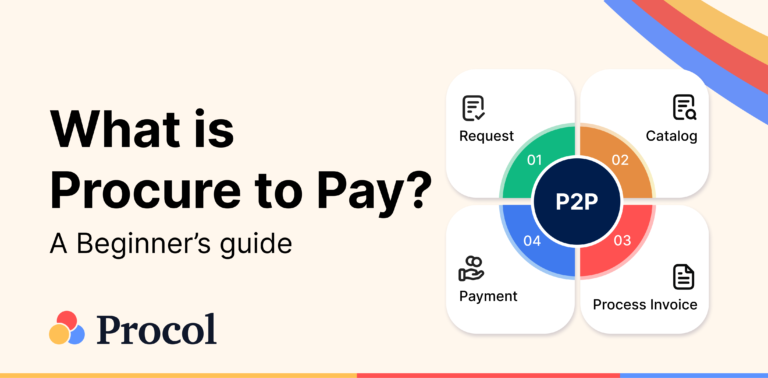
What is Procure-to-pay (P2P)? An Ultimate Guide
Procure to pay is the process from procurement of materials needed...
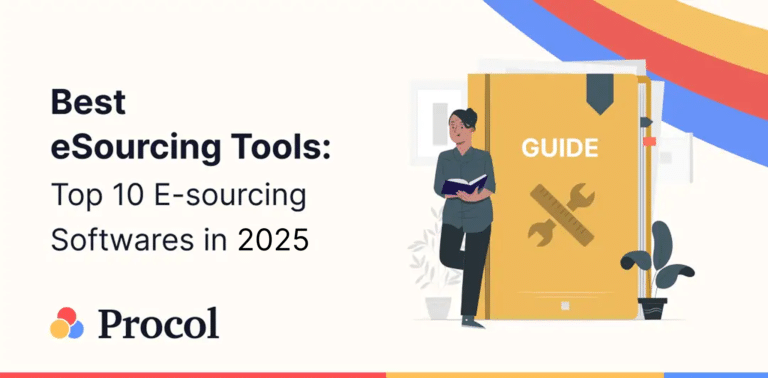
Best eSourcing Tools: Top 10 eSourcing Software in 2025
Discover top 10 e-sourcing tools and esourcing platforms necessary for efficient...
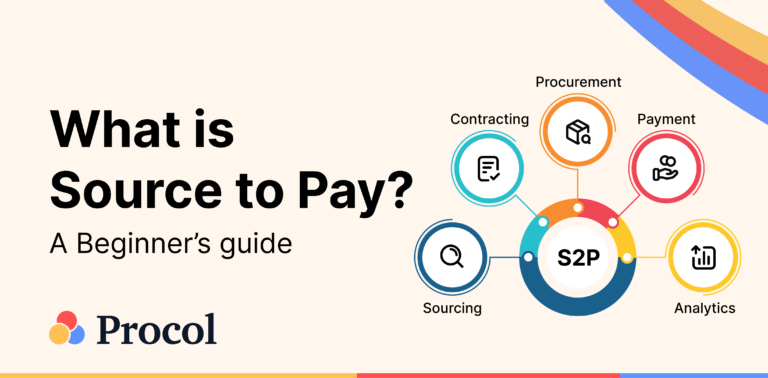
What is Source-to-pay in 2025? An Ultimate Guide
Source to pay is the process of sourcing vendors to procure...









